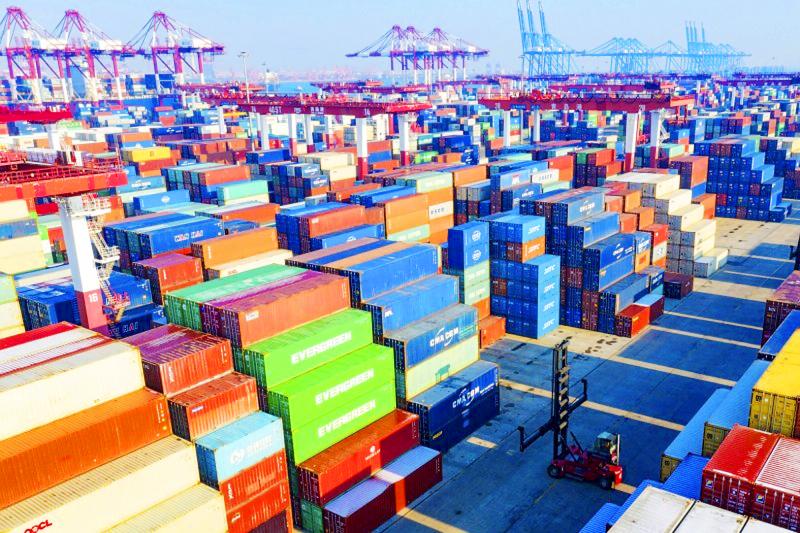Taiwan’s exports last month clocked another 12 percent upturn from a year earlier to a record US$33 billion, as 5G smartphones and other new technology applications ramped up business for local component suppliers, the Ministry of Finance (MOF) said yesterday.
The growth momentum might gather further strength this month with increases from 19 percent to 23 percent, aided by three more working days in January this year compared with last year, the ministry said.
“The factors driving the growth look sustainable and the timing of the Lunar New Year holiday will also lend support,” Department of Statistics Director-General Beatrice Tsai (蔡美娜) told a news conference in Taipei.

Photo: Wu Chi-lun, Taipei Times
Demand for 5G communication, high-performance chips, as well as remote-working and education devices remain high, Tsai said, adding that iPhone 12 sales proved stronger than expected.
Taiwan is home to suppliers of chips, camera lenses, casing, touch panels, battery packs and assemblers to Apple Inc.
Meanwhile, strong demand for laptops, servers, and other information and communication technology (ICT) products showed no sign of receding as COVID-19 infections spike around the world, Tsai said.
Electronics exports soared 22.2 percent to US$12.76 billion, while shipments of ICT products gained 17.6 percent to US$4.77 billion, jointly contributing about 50 percent to overall exports, ministry data showed.
Optical products, mainly flat panels, posted the fastest advance of 27 percent year-on-year, Tsai said.
Demand for non-technology products also showed a healthy recovery — with shipments of plastic, chemical and base metal products gaining 2 percent to 15.5 percent, the ministry said, adding that mineral and textile products continued to buck the trend, slumping up to 52.4 percent year-on-year.
Import data showed a positive cyclical movement for the second straight month, even though the increase tapered to 0.9 percent, giving Taiwan a large trade surplus of US$5.76 billion that has more than doubled year-on-year, Tsai said.
Imports of capital equipment dropped 6.4 percent due to the timing of equipment arrivals, she said.
Exports rose 11.7 percent year-on-year to US$97.21 billion last quarter, stronger than the November forecast of 7.8 percent by the Directorate-General of Budget, Accounting and Statistics, Tsai said.
For the whole of last year, outbound shipments hit a record high of US$345.28 billion, representing a 4.9 percent increase from a year earlier, outperforming rivals around the world, Tsai said.
Imports grew a mild 3.2 percent to US$78.72 billion last quarter, allowing for a slim gain for the whole year of 0.3 percent to US$286.49 billion, she said.

UNCERTAINTY: Innolux activated a stringent supply chain management mechanism, as it did during the COVID-19 pandemic, to ensure optimal inventory levels for customers Flat-panel display makers AUO Corp (友達) and Innolux Corp (群創) yesterday said that about 12 to 20 percent of their display business is at risk of potential US tariffs and that they would relocate production or shipment destinations to mitigate the levies’ effects. US tariffs would have a direct impact of US$200 million on AUO’s revenue, company chairman Paul Peng (彭雙浪) told reporters on the sidelines of the Touch Taiwan trade show in Taipei yesterday. That would make up about 12 percent of the company’s overall revenue. To cope with the tariff uncertainty, AUO plans to allocate its production to manufacturing facilities in

TAKING STOCK: A Taiwanese cookware firm in Vietnam urged customers to assess inventory or place orders early so shipments can reach the US while tariffs are paused Taiwanese businesses in Vietnam are exploring alternatives after the White House imposed a 46 percent import duty on Vietnamese goods, following US President Donald Trump’s announcement of “reciprocal” tariffs on the US’ trading partners. Lo Shih-liang (羅世良), chairman of Brico Industry Co (裕茂工業), a Taiwanese company that manufactures cast iron cookware and stove components in Vietnam, said that more than 40 percent of his business was tied to the US market, describing the constant US policy shifts as an emotional roller coaster. “I work during the day and stay up all night watching the news. I’ve been following US news until 3am

Taiwan will prioritize the development of silicon photonics by taking advantage of its strength in the semiconductor industry to build another shield to protect the local economy, National Development Council (NDC) Minister Paul Liu (劉鏡清) said yesterday. Speaking at a meeting of the legislature’s Economics Committee, Liu said Taiwan already has the artificial intelligence (AI) industry as a shield, after the semiconductor industry, to safeguard the country, and is looking at new unique fields to build more economic shields. While Taiwan will further strengthen its existing shields, over the longer term, the country is determined to focus on such potential segments as

COLLABORATION: Given Taiwan’s key position in global supply chains, the US firm is discussing strategies with local partners and clients to deal with global uncertainties Advanced Micro Devices Inc (AMD) yesterday said it is meeting with local ecosystem partners, including Taiwan Semiconductor Manufacturing Co (TSMC, 台積電), to discuss strategies, including long-term manufacturing, to navigate uncertainties such as US tariffs, as Taiwan occupies an important position in global supply chains. AMD chief executive officer Lisa Su (蘇姿丰) told reporters that Taiwan is an important part of the chip designer’s ecosystem and she is discussing with partners and customers in Taiwan to forge strong collaborations on different areas during this critical period. AMD has just become the first artificial-intelligence (AI) server chip customer of TSMC to utilize its advanced